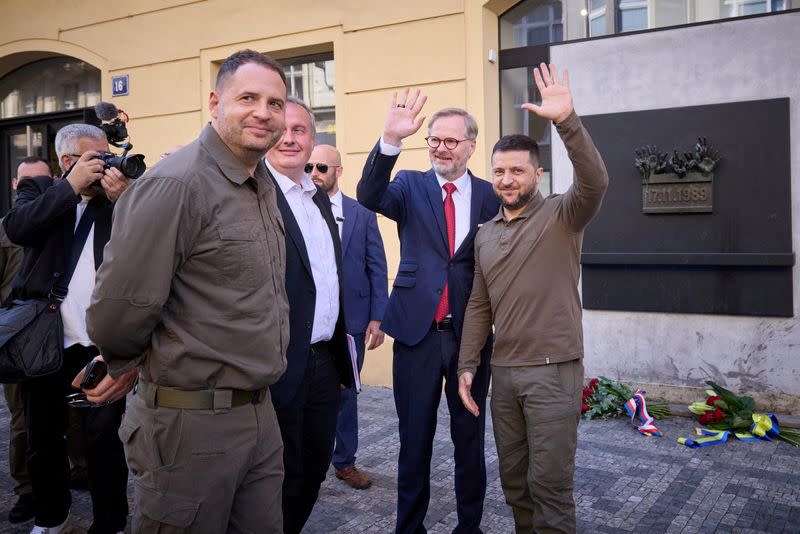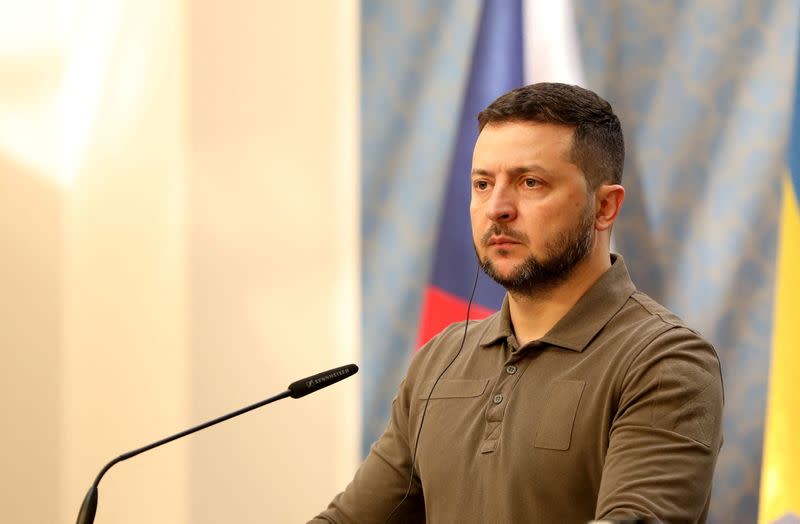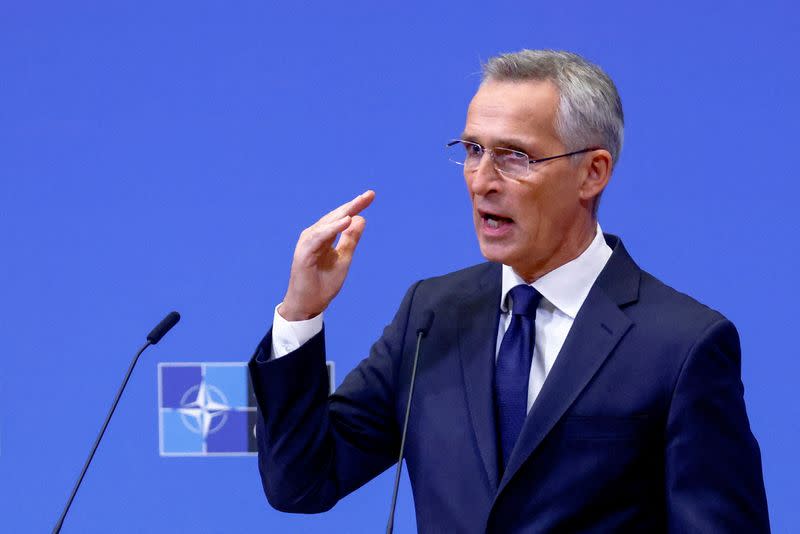NATO makes membership pledge to Ukraine as Zelenskiy drums up support
By Robert Muller
PRAGUE (Reuters) -The head of NATO said on Friday the military alliance would unite at a summit next week on how to bring Kyiv closer to joining, while Ukraine's president drummed up support for its membership bid on a tour of several NATO states.
President Volodymyr Zelenskiy visited the Czech Republic and Slovakia a day after holding talks in Bulgaria, and was due to travel to Turkey later on Friday.
In Prague, he won a pledge of support for Ukraine to join NATO "as soon as the war (with Russia) is over", and in Sofia secured backing for membership "as soon as conditions allow".
Slovakia said the question of Kyiv's membership was "when", not "if".
At a news conference in Bratislava, Zelenskiy said he expected unity among NATO member states at the July 11-12 summit in Vilnius and wanted concrete steps on Ukraine's movement to join the alliance.
"There is strength in unity of NATO," he said, adding that undecided questions over Ukraine's future in NATO and Sweden's pending membership were "a threat to the alliance's strength".
However it remains unclear what Ukraine will be offered in the Lithuanian capital. The alliance is divided over how fast Ukraine should move towards membership, and some countries are wary of any step that might take NATO closer to war with Russia.
Zelenskiy has acknowledged that Kyiv is unlikely to be able to join NATO while at war with Russia.
NATO Secretary-General Jens Stoltenberg reaffirmed his view that Ukraine would become a member.
"Our summit will send a clear message: NATO stands united, and Russia's aggression will not pay," Stoltenberg told a news conference in Brussels.
Slovak President Zuzana Caputova said she expected the summit to produce a deepening of practical and political cooperation with Ukraine, "for example in the form of the creation of a NATO-Ukraine Council".
Russian President Vladimir Putin has cited NATO's expansion towards Russia's borders over the past two decades as a reason for his decision to send tens of thousands of troops into Ukraine on Feb. 24, 2022.
He has threatened unspecified action if Ukraine joins NATO.
TALKS DUE IN TURKEY
Despite Russia's anger, Czech Prime Minister Petr Fiala told a news conference with Zelenskiy in Prague that he expected all NATO allies to support Ukraine in its membership aspirations.
"I am convinced that the future of Ukraine is in the European Union, the future of Ukraine is in NATO, and this will ensure that a situation like the one we are experiencing in Europe will not happen again," Fiala said.
Zelenskiy and Fiala visited a memorial dedicated to Czechoslovakia's 1989 Velvet Revolution protests that peacefully overthrew communist rule. The speaker of the lower house of parliament gave Zelenskiy a black T-shirt saying "Russia is a terrorist state", a phrase from a 2022 parliamentary resolution.
Prague has been a strong backer of Kyiv, providing military aid and other help, and Fiala promised more attack helicopters and hundreds of thousands more large-calibre ammunition rounds.
Zelenskiy welcomed the "new, powerful, very timely defence package" but said more weapons were needed.
"Without long-range weapons it is difficult not only to carry out an offensive mission but also to conduct a defensive operation," he said. "First of all, we are talking about long-range systems with the United States and it depends only on them today."
Kyiv says it has taken back a cluster of villages in southern Ukraine since launching a counteroffensive in early June, but that it lacks the firepower and air cover to make faster progress.
After his talks in Prague and Slovakia, Zelenskiy was due to meet Turkish President Tayyip Erdogan in Istanbul.
Turkish officials said the two leaders would discuss the potential extension of a wartime grain deal allowing the safe export of Ukrainian grain via the Black Sea.
Russia, angry about aspects of the grain deal's implementation, has threatened not to allow its further extension beyond July 17.
(Additional reporting by Jason Hovet and by Pavel Polityuk and Olena Harmash in Kyiv, Writing by Timothy Heritage, Editing by Gareth Jones and Philippa Fletcher)



